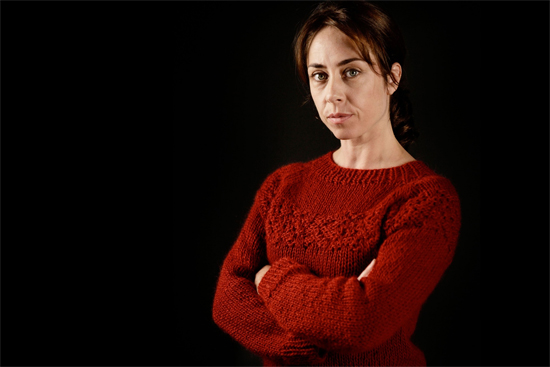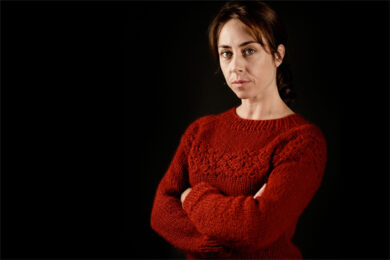If the first two episodes of the new series are any indicator, it’s going to be a plain deep red one this season, and unlikely to prove as big a talking point as its predecessor. Sarah Lund’s chunky patterned sweater prompted acres of press coverage when UK audiences were introduced to The Killing in January, making it the most iconic crime fighter knitwear since Starsky’s cardigan.
Not that the Danish detective’s sartorial choices detracted too much from the task at hand; it was merely a sensible and functional item of clothing to ward off the bitterness of a Scandinavian winter while a pensive Lund (Sofie Grabol) unravelled the puzzles surrounding the murder of schoolgirl Nanna Birk Larssen. Job done? Can we move on to the stuff that matters now, please?
The first series of The Killing was a master class in how to make a slowburn whodunit; 20 hours of television littered with clues, curveballs, red herrings, criminal intrigue, police procedural confrontation, political scandal, viable suspects and grieving relatives. Nanna’s death was merely the jumping-off point for a lattice weave of utterly human stories, played out against a cold and clinical geographical landscape, what more than one reviewer referred to as "bleak chic".
After a low-key debut, word of mouth spread quickly, to the point where it became the most talked-about foreign language production ever shown on British television, scoring a Bafta for Best International Programme (a second nomination in the Audience category saw it lose out to The Only Way Is Essex).
Although the series first aired in its birthplace and across mainland Europe back in 2007, its belated arrival here was perfect timing for a BBC4 viewership already primed to embrace continental crime drama in the form of its near neighbour Sweden’s Wallander and French nail-biter Spiral, as well as the big screen trilogy beginning with The Girl With The Dragon Tattoo. Grouped together, these earthy and unadorned works were a refreshing contrast to the flash and floss of American imports – more Ken Loach than Castle.
As Season Two opens, a disillusioned and demoted Lund is enduring more mundane employment as a passport controller in the sleepy southern ferry port of Gedser (Population: 809, according to official statistics from earlier this year), when her old boss Detective Chief Inspector Lennart Brix asks her to return to Copenhagen, but only to consult on another gruesome murder. On the surface, the slaughter of a female lawyer appears to be an open-and-shut case; her estranged husband is in custody and about to be charged, but an initially reluctant Lund isn’t convinced. She asks to stay with the investigation and pursue other lines of inquiry. Well, she would, wouldn’t she?
While being careful not to give too much away in advance (the opening brace of Season Two episodes suggest the storylines may develop quicker than before), there is a school of thought that the lawyer’s demise was politically motivated, the act of Muslim terrorists angered by her work in Afghanistan, a theory that gains weight when a second body is discovered. It’s something of a bold plot move, coming just a few short years after the 2006 controversy of cartoons depicting the Islamic prophet Mohammed published in the Danish newspaper Jyllands-Posten, which led to violent protests by Muslim communities around the world.
Meanwhile, and seemingly unconnected, though probably not in the long run, army sergeant Peter Raben languishes in a military hospital after his own traumatic experiences in Afghanistan, desperate to show his doctors that he’s well enough to be discharged, and fearing he’s about to lose all contact with his wife (the daughter of a high-ranking officer) and young son. Elsewhere, newly installed justice minister Thomas Buch locks horns with far-right political opponents, until the arrival of a shocking video via email redirects his attention…
These will be motifs familiar to fans of what went down last time; Raben’s threadbare grip on his family echoes the fragility of Nanna’s parents in the first series, while Buch is arguably a screen successor to the idealistic mayoral candidate Troels Harmann, whose Season One skirmishes with schemers in the corridors of power threatened to derail his good intentions.
Lund’s domestic situation, however, is only hinted at in the opening episodes of the new series. She appears to be living by herself, fiancé long gone, while her teenage son has moved in permanently with his grandmother. Sarah stands alone, family shifted to the fringes, and all but shunned in a busy squad room by fellow officers aware of the headaches she gave everyone last time round. There’s the possibility of a simpatico working relationship with one detective, but considering how Jan Meyer met a grisly end in the first series he might be advised to keep his distance.
The return of The Killing hasn’t come soon enough, helping to clear the palate of the underwhelming US remake screened recently by Channel 4. The reworking of such rich and involving fare is almost inevitable; the Kenneth Branagh-led Brit take on Wallander thrives by remaining relatively faithful to the scripts and sombre atmosphere of the original, although we have yet to see how director David Fincher (Se7en, Zodiac) handles his own makeover of Scandinavian source material – the American version of The Girl With The Dragon Tattoo opens in UK cinemas in late December.
But it was never going to be easy to fashion something as individual as The Killing for a wider audience, as few programme makers would have the daring to stay true to its glacial momentum or attention to detail. Denmark itself is a vital component to the series’ success, the country’s washed-out greys and unforgiving impersonal architecture an ideal and ominous backdrop to unspeakable evils.
Also, the notion of anyone other than the glamour-forsaking Sofie Grabol, dressed down to suggest exactly how female detectives are in the real world, is unthinkable. It’s Grabol’s understated and honest performance as a troubled yet supremely capable everywoman that has established Sarah Lund as the most believable and brilliant TV cop of the 21st century. Stick that up your jumper.
The Killing returns to BBC4 this Saturday, November 19, at 9pm



